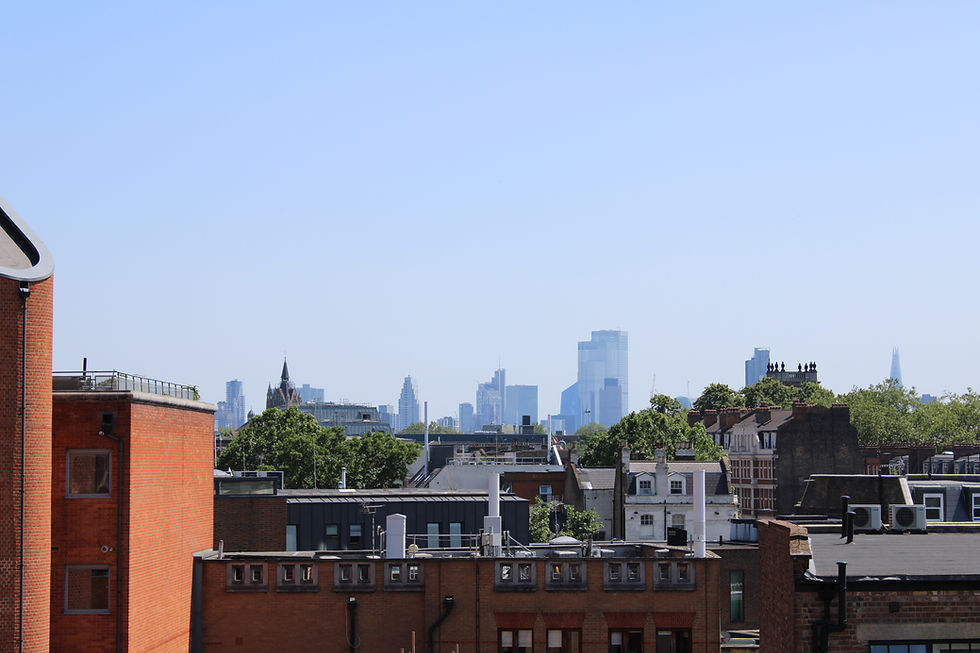The beginning of the end for London?
- punto.london
- Jun 7, 2020
- 3 min read
Updated: Jul 26, 2020
The office was the lynchpin of London life but with remote-working rendering it somewhat obsolete, what will become of the capital?
Claire Houlahan | June 7th 2020

There has been much conjecture around London’s future since the Brexit vote. One of the leading financial centres of the world is fracturing and the vultures; otherwise known as Dublin, Frankfurt, Madrid, Paris, Amsterdam and even Luxembourg are circling.
Next a global pandemic shuts down the whole city causing entire workforces to reboot from their kitchen tables the next morning. Tricky stuff for the 87% of Londoners who never worked from home prior to COVID-19, according to an ONS home working survey last year.
Yet for something that was once approached with some degree of wariness, remote working is now in place for just under half the UK workforce thanks to cloud-based technology and easy-to-use video conferencing software. The office, once a cornerstone of London life has largely disappeared and without much ado.
A senior HR consultant at one of London’s leading communication’s agencies reported that 100% of their employees are now working fully from home with productivity levels similar to before the pandemic. The relative ease of the transition “has changed attitudes to remote working for everyone” and keeping this flexibility would be widely seen as a positive outcome of the coronavirus. “The focus should be on the output of work and not on presenteeism”.
Twitter is allowing their employees to work from home “forever” whilst other companies like Barclay’s, Facebook, Google, Mastercard and Spotify are encouraging staff to continue remote working until much later in the year. Even small to medium-sized businesses who previously had very little flexible-working culture, will be forced to re-evaluate how they operate after the lockdown. It is undoubtedly the start of a changing culture for the white-collar Londoner.
It follows that with the loosening grip of the office and the self-reflection that lockdown has brought, many people are questioning their need to remain in the city. Savills and Rightmove have reported an increase in prospective buyers considering a move to the countryside. 30% of Londoners questioned are prepared to swap city life for rural bliss, according to Savills. Although property outside of London has always been attractive for those seeking more value for money, the pandemic has provoked a definite change in attitudes towards work/life balance. With flexible-working likely to be commonplace, buyers will not just have to settle for commuter towns either.
Yet London has always had a magnetic pull and Tom Bill from Knight Frank reports that “as of 5th May 2020, the total potential spend of all buyers registered with Knight Frank in London was £52 billion”, representing a 20% increase from the same day last year. Clearly some “pent-up demand continuing to build” in the city. Although, now the London buyer will be placing more importance than ever on that coveted and none too widely available outdoor space. “Those houses with gardens that receive maximum sunlight and privacy will have even more value as people really start to use their own space. The size of a terrace or balcony will be extremely important to buyers now,” comments Andrew Groocock, Knight Frank’s Regional partner for City & East London.
For the moment it seems, neither Brexit nor a pandemic can dull the shine of London. Except one divides and the other unites and the coronavirus outbreak has taught us many things that could bring lasting and positive change for the city and for ourselves. Among those, the importance of community, supporting small and local businesses, slowing down, taking better care of ourselves and the planet around us. On their ‘Coronavirus and the Social Impacts on Great Britain’ report, the ONS stated that only “22% of people believed that Britain was somewhat or very united before coronavirus” but that 49% believed that there would be greater unity after the pandemic.
We will need that unity to face the hurdles ahead; an economic downturn, prolonged social distancing measures and navigating the fallout from Brexit, whenever that will be. The future of the capital may still be uncertain but what it does it tell us that it takes six major cities to compete for London’s place?
.png)

Comments